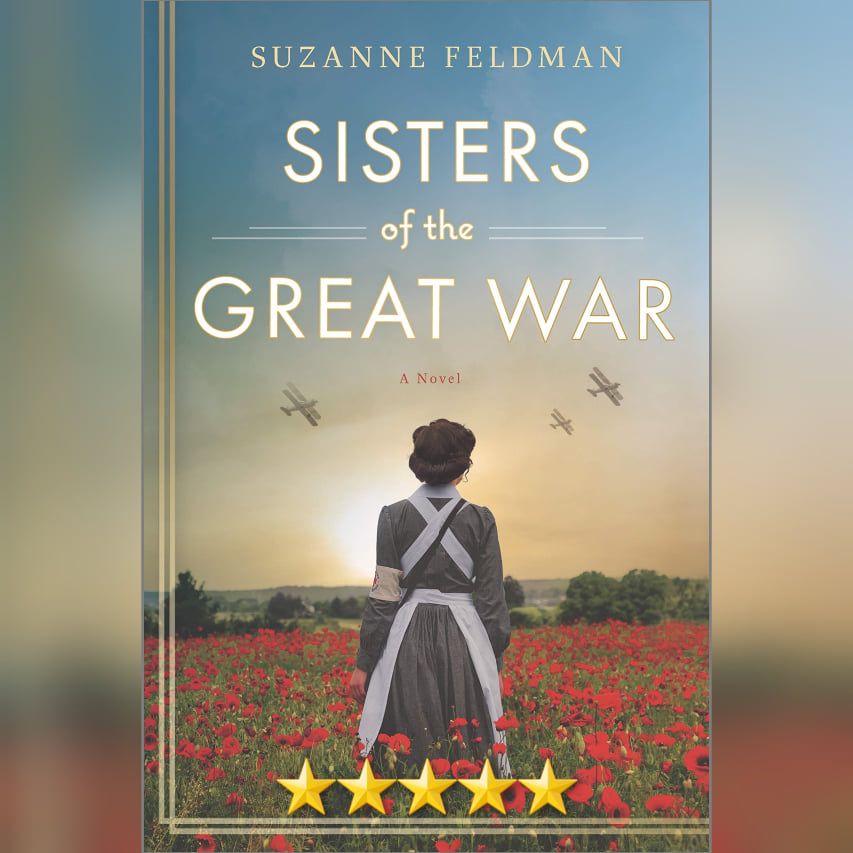For this blog tour we’re looking at a visceral tale of atypical women – certainly for their time, but even (to a slightly lesser extent) in our “modern” time a century after the events here. For this blog tour we’re looking at Sisters Of The Great War by Suzanne Feldman.
Here’s what I had to say about the book on Goodreads:
Visceral Tale Of Atypical Women. This is a tale of atypical women in a very atypical (well, not really) time, where Feldman does a remarkable job of showing the full realities of everything she portrays. Whether it be the one sister who wants to be a doctor and is willing to do whatever it takes to achieve that goal, the other sister who is comfortable around cars and not much else, or the war itself – in all of its gory, gritty details and mechanisms. Truly one of the more realistic novels I’ve seen of this period, even as it portrays women who were far from normal in that period. Very much recommended.
After the jump, an excerpt from Chapter 1 of the book, followed by the “publisher details” – book details, description, author bio, web/ social links, and links to buy the book.
1
Baltimore, Maryland
August 1914Ruth Duncan fanned herself with the newspaper in the summer heat as Grandpa Gerald put up a British flag outside the house. If he’d had a uniform—of any kind—he would have worn it. People on the sidewalk paused and pointed, but Grandpa, still a proper English gent even after almost twenty years in the U.S., smoothed his white beard and straightened his waistcoat, ignoring the onlookers.
“That’s done,” he said.
Ruth’s own interest in the war was limited to what she read in the paper from across the dining table. Grandpa would snap the paper open before he ate breakfast. She could see the headlines and the back side of the last page, but not much more. Grandpa would grunt his appreciation of whatever was in-side, snort at what displeased him, and sometimes laugh. On the 12th of August, the headline in the Baltimore Sun read; France And Great Britain Declare War On Austria-Hungary, and Grandpa wasn’t laughing.
Cook brought in the morning mail and put it on the table next to Grandpa. She was a round, grey-haired woman who left a puff of flour behind her wherever she went.
“Letter from England, sir,” Cook said, leaving the envelope and a dusting of flour on the dark mahogany. She smiled at Ruth and left for the kitchen.
Grandpa tore the letter open.Ruth waited while he read. It was from Richard and Diane Doweling, his friends in London who still wrote to him after all these years. They’d sent their son, John, to Harvard in Massachusetts for his medical degree. Ruth had never met John Doweling, but she was jealous of him, his opportunities, his apparent successes. The Dowelings sent letters whenever John won some award or other. No doubt this was more of the same. Ruth drummed her fingers on the table and eyed the dining room clock. In ten minutes, she would need to catch the trolley that would take her up to the Loyola College of Nursing, where she would be taught more of the things she had already learned from her father. The nuns at Loyola were dedicated nurses, and they knew what they were doing. Some were out-standing teachers, but others were simply mired in the medicine of the last century. Ruth was frustrated and bored, but Father paid her tuition, and what Father wanted, Father got.
Ruth tugged at her school uniform—a white apron over a long white dress, which would never see a spot of blood. “What do they say, Grandpa?”
He was frowning. “John is enlisting. They’ve rushed his graduation at Harvard so he can go home and join the Royal Army Medical Corps.”
“How can they rush graduation?” Ruth asked. “That seems silly. What if he misses a class in, say, diseases of the liver?”
Grandpa folded the letter and looked up. “I don’t think he’ll be treating diseases of the liver on the battlefield. Anyway, he’s coming to Baltimore before he ships out.”
“Here?” said Ruth in surprise. “But why?”
“For one thing,” said Grandpa, “I haven’t seen him since he was three years old. For another, you two have a common interest.”
“You mean medicine?” Ruth asked. “Oh, Grandpa. What could I possibly talk about with him? I’m not even a nurse yet, and he’s—he’s a doctor.” She spread her hands. “Should we discuss how to wrap a bandage?”
“As long as you discuss something.” He pushed the letter across the table to her and got up. “You’ll be showing him around town.”
“Me?” said Ruth. “Why me?”“Because your sister—” Grandpa nodded at Elise, just clumping down the stairs in her nightgown and bathrobe “—has dirty fingernails.” He started up the stairs. “Good morning, my dear,” he said. “Do you know what time it is?” “Uh huh,” Elise mumbled as she slumped into her seat at the table.
As Grandpa continued up the stairs Ruth called after him. “But when is he coming?”
“His train arrives Saturday at noon,” Grandpa shouted back. “Find something nice to wear. You too, Elise.”
Elise rubbed her eyes. “What’s going on?”
Ruth pushed the letter at her and got up to go. “Read it,” she said. “You’ll see.”
Ruth made her way down Thirty-Third Street with her heavy bookbag slung over one shoulder, heading for the trolley stop, four blocks away, on Charles. Summer classes were almost over, and as usual, the August air in Baltimore was impenetrably hot and almost unbreathable. It irritated Ruth to think that she would arrive at Loyola sweaty under her arms, her hair frizzed around her nurse’s cap from the humidity. The nuns liked neatness, modest decorum. Not perspiring young women who wished they were somewhere else.
Elise, Ruth thought, as she waited for a break in the noisy traffic on Charles Street, could’ve driven her in the motor-car, but no, she’d slept late. Her younger sister could do pretty much anything, it seemed, except behave like a girl. Elise, who had been able to take apart Grandpa’s pocket watch and put it back together when she was six years old, was a use-ful mystery to both Father and Grandpa. She could fix the car—cheaper than the expensive mechanics. , For some rea-son, Elise wasn’t obliged to submit to the same expectations as Ruth—she could keep her nails short and dirty. Ruth wondered, as she had since she was a girl, if it was her younger sister’s looks. She was a mirror image of their mother, who had died in childbirth with Elise. Did that make her special in Father’s eyes?
An iceman drove a sweating horse past her. The horse raised its tail, grunted, and dropped a pile of manure, rank in the heat, right in front of her, as though to auger the rest of her day. The iceman twisted in the cart to tip his hat. “Sorry Sister!”
Ruth let her breath out through her teeth. Maybe the truth of the matter was that she was the ‘sorry sister.’ It was at this exact corner that her dreams of becoming a doctor, to follow in her father’s footsteps, had been shot down. When she was ten, and the governess said she’d done well on her writing and math, she was allowed to start going along on Father’s house calls and help in his office downstairs. Father had let her do simple things at first; mix plaster while he positioned a broken ankle, give medicine to children with the grippe, but she watched everything he did and listened carefully. By the time she was twelve, she could give him a diagnosis, and she remembered her first one vividly, identifying a man’s abdominal pain as appendicitis.
“You did a good job,” Father had said to her, as he’d reined old Bess around this very corner. “You’ll make an excellent nurse one day.”
Ruth remembered laughing because she’d thought he was joking. Her father’s praise was like gold. “A nurse?” she’d said. “One day I’ll be a doctor, just like you!”
“Yes, a nurse,” he’d said firmly, without a hint of a smile. It was the tone he used for patients who wouldn’t take their medicine.
“But I want to be a doctor.”
“I’m sorry,” he said. He hadn’t sounded sorry at all. “Girls don’t become doctors. They become nurses and wives. Tomorrow, if there’s time, we’ll visit a nursing college. When you’re eighteen, that’s where you’ll go.”
“But—”
He’d shaken his head sharply, cutting her off. “It isn’t done, and I don’t want to hear another word about it.”
A decade later, Ruth could still feel the shock in her heart. It had never occurred to her that she couldn’t be a doctor because she was a girl. And now, John Doweling was coming to town to cement her future as a doctor’s wife. That was what everyone had in mind. She knew it. Maybe John didn’t know yet, but he was the only one.
Ruth frowned and lifted her skirts with one hand, balancing the bookbag with the other, and stepped around the manure as the trolley came clanging up Charles.
 SISTERS OF THE GREAT WAR
SISTERS OF THE GREAT WAR
Author: Suzanne Feldman
ISBN: 9780778311225
Publication Date: October 26, 2021
Publisher: MIRA Books
Book Summary:
Two sisters. The Great War looming. A chance to shape their future.
Sisters Ruth and Elise Duncan could never have anticipated volunteering for the war effort. But in 1914, the two women decide to make the harrowing journey from Baltimore to Ypres, Belgium in order to escape the suffocating restrictions placed on them by their father and carve a path for their own future.
Smart and practical Ruth is training as a nurse but dreams of becoming a doctor. In a time when women are restricted to assisting men in the field, she knows it will take great determination to prove herself, and sets out to find the one person who always believed in her: a handsome army doctor from England. For quiet Elise, joining the all female Ambulance Corps means a chance to explore her identity, and come to terms with the growing attraction she feels towards women. Especially the charming young ambulance driver who has captured her heart.
In the twilight of the Old World and the dawn of the new, both young women come of age in the face bombs, bullets and the deadly futility of trench warfare. Together they must challenge the rules society has placed on them in order to save lives: both the soldiers and the people they love.
 Author Bio:
Author Bio:
Suzanne Feldman, a recipient of the Missouri Review Editors’ Prize and a finalist for the Bakeless Prize in fiction, holds an MA in fiction from Johns Hopkins University and a BFA in art from the Maryland Institute College of Art. Her short fiction has appeared in Narrative, The Missouri Review, Gargoyle, and other literary journals. She lives in Frederick, Maryland.
Social Links:
Author Website
Twitter: @suzanne21702
Facebook: @SuzanneFeldman
Instagram: @suzannefeldmanauthor
Goodreads
Buy Links:
BookShop.org
Harlequin
Barnes & Noble
Amazon
Books-A-Million
Powell’s


